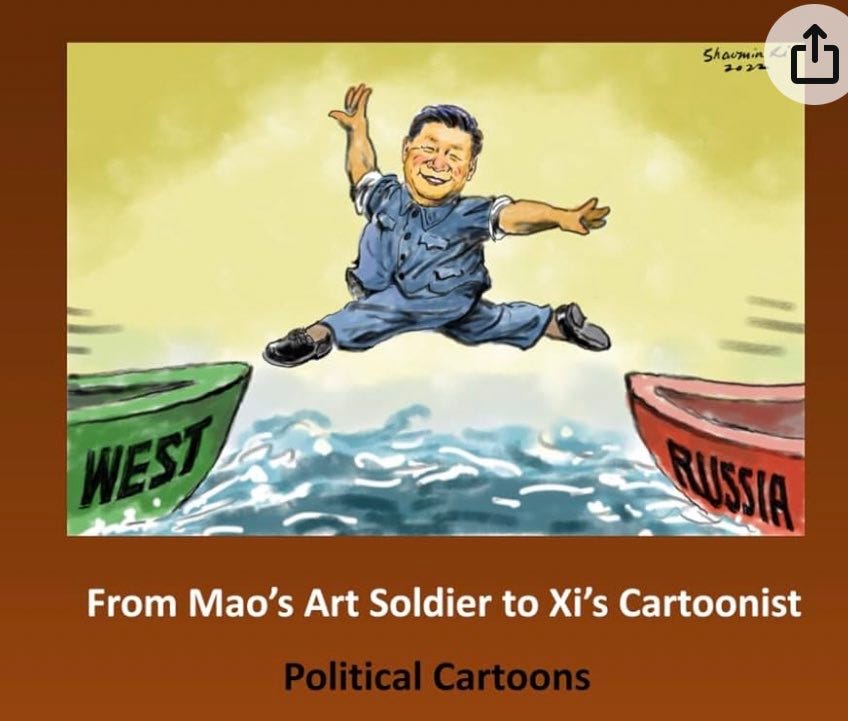I’ve been scratching an itch regarding Alexander Dugin. He is a socrealist. I believe I may be correct. While doing some digging I came across this article from 1957 and I wrote the following on X.
https://archive.ph/2024.01.22-185509/https://www.foreignaffairs.com/articles/russian-federation/1957-04-01/renaissance-russian-intelligentsia
This article is remarkable. It’s also eerie how relatable it is.
“While a combination of piecemeal concessions and appeals for Party unity may satisfy some older intellectuals who have a twilight nostalgia for Lenin and the atmosphere of the twenties, the problem of the young students is deeper. These are children of the Stalin era only. They had been taught unceasingly to believe that, no matter what, there was in their system a "magic citadel" of infallibility in which their own lives acquired meaning and purpose. With the revelations of Khrushchev's secret speech, a deep shock set in--not so much at the revelation of Stalin's use of cruel means as at the gnawing thought that the end, in the name of which all this suffering was tolerated, had itself become hopelessly corrupted. When a myth as vast and pretentious as Stalin's becomes at last dispelled, those who have lived exclusively under its spell are left numbed, disarmed and resentful. It is not surprising that the most sensitive leaders of Soviet student life should feel unable to do anything but finish the job of negation which Khrushchev had begun and begin to look within themselves and their small circle of trusted friends for something new to live by and for.
It is in the light of a profound search for some new basis for personal integrity that the unrest of the young intellectuals in the U.S.S.R. must be understood. They are, as the régime has accused them of being, individualists.”
“Although they do not know what they want, they are united in knowing what they do not want: the impersonal, petty and pointless world of bureaucratic state Communism. Their hero is Lopatkin, the lonely and persecuted inventor who is the main character in the new and much-discussed novel by Vladimir Dudintsev, "Not by Bread Alone." Lopatkin succeeds in spite of the system and the Communist Party rather than because of them, as is the standard pattern. He retains his individuality to the end, deriving his satisfaction from his work, from a small group of friends and from listening to great music.”
My suspicions keep being reinforced - the answer to our problem with totalitarian creep is, as it was then (1957 is the example above) not political. It’s far more complex and nuanced since a human being is far more complex and nuanced.
What I think we are seeing to a large degree is a preemptive attempt by those familiar with what worked before - radical individualism, surrealism, absurdism, art and all the gifts of classical liberalism and how art organically reflects life in every way that “theory” subverts it - to distract from nature to concoct an illusion built on a foundation of illusion.
This strange puritanical and identitarian/ racial nationalistic trend invading all ends of politics is in fact this attempt and reinforcing of what socrealism does - eliminates the truth of the intrinsic (not necessarily revealed because we are also imperfect) divine nature of every human being. Why? By proposing a polemical God to replace our Creator - we eliminate autonomy and reconstitute (via Theory) the falsehood that we are powerless against a force that has something worse than apathy toward us, but outright disdain and contempt for humanity.
The twisting of Russian History, and what constitutes Russian Pride is not new - it’s precisely what’s been done before.
Frankly the likes of Alexander Dugin and some voices (I disagree that Orban or Putin are the problem themselves btw) out of Hungary and Poland as well seem less Soviet and far more Maoist. The difference?
A suicidal like behavior.
My mother has often said something which I think is very important - I didn’t realize how much so until moments ago.
Russians are not suicidal.
My sense is this- Alexander Dugin is as Russian as Stalin was; not at all.
What he is is a socrealist philosopher like Ladinov and Gorky with as much interest in the character of anybody or anyone as they had.
One might even call him simply a cosmoist- a branch of “art” which focuses on a merging of communism with a messianic religiosity for the singular purpose of ultimately replacing all that is mystic or esoteric or spiritual or purposeful with Purpose - the godhead of liberation theology.
Politics doesn’t stop this anymore than it was able to stop Jonestown. The end game is the same and the process as well. The sooner we realize this and take the tools former dissidents like Ionesco and Havel molded for us- and fight back with the same creative but also passionate fervor for truth (distinct from facts) the faster we win and the shorter totalitarianism creeps on and cements us deeper into a postotalitarian society.
More to come.




